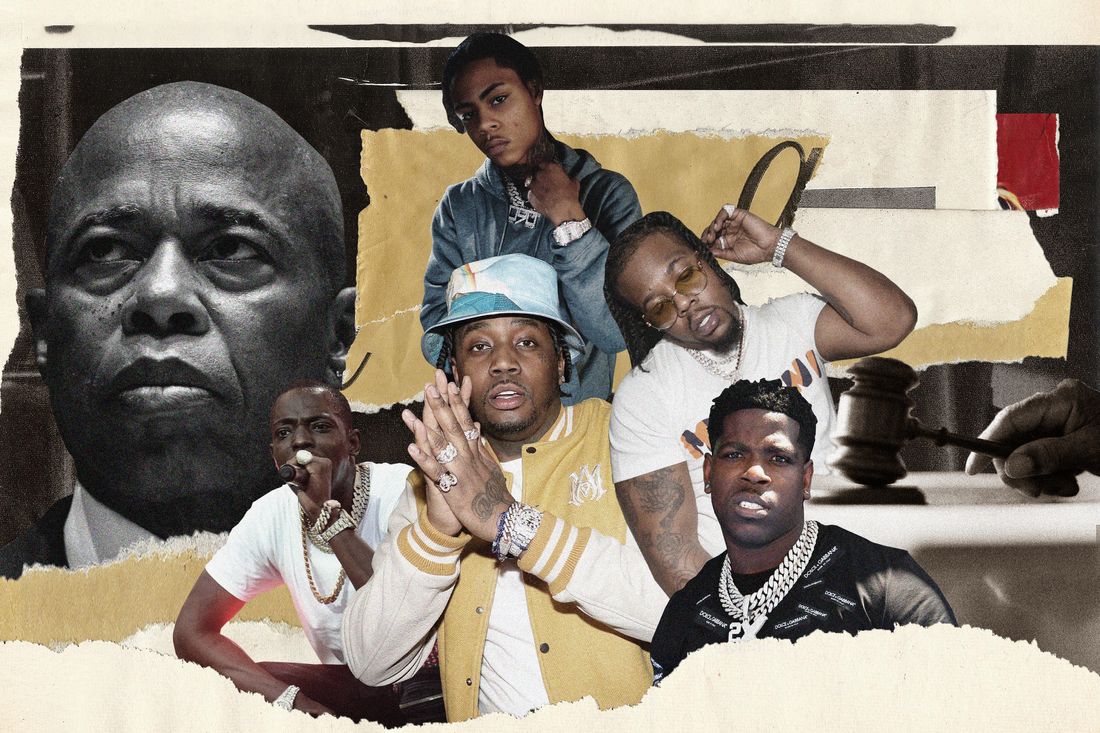
Shortly after the deaths of two aspiring rappers earlier this year, New York City mayor Eric Adams appeared to take a hard line against drill rap, stressing in a February speech that social-media companies should pull the genre’s displays of gun violence from their apps, comparing the removal to Trump’s Twitter suspension. His words sparked a backlash as they not only seemed to toy with the idea of censorship but also evoked the language of authorities’ long-standing moral panic over music created by Black and brown artists.
Adams, a former NYPD cop, walked back his comments after a meeting with several rappers — including Fivio Foreign and Maino — which he described as a “great conversation,” and he claimed to have reassured performers that he didn’t want to ban drill outright. The city’s official tone on drill might have shifted, but the fact remains that the discourse among some authorities surrounding the subgenre seems to emphasize ties between drill and alleged criminal activity. Legal representatives for drill rappers and advocates at the state level have expressed concern that the justice system might be reading far too deeply into artistic elements of drill — and rap in general — during investigations, mistaking braggadocio or fantasy for admission of wrongdoing.
There are efforts to address this. Several New York lawmakers are pushing “Rap Music on Trial” legislation to bar prosecutors from using “creative expression,” such as lyrics, as criminal evidence against someone “without clear and convincing proof.” Two U.S. representatives, including New York’s Jamaal Bowman, recently introduced the federal Restoring Artist Protection Act, or RAP Act, to “protect artists from the wrongful use of their lyrics against them in criminal and civil proceedings.” Here is what several attorneys for drill rappers and lawmakers fighting for fair law enforcement have to say about the tense relationship between rap and policing.
New York drill, as told by …
19 artists who define the scene.
The tragedy of Jayquan McKenley.
The sound itself.
The essential tracks.
.
Lawyers and lawmakers.
Adam Lustberg, attorney for Fivio Foreign, on witnessing a spike in police attention on rappers.
The “City of Gods” rapper from Brooklyn was arrested on gun charges in New Jersey in April 2021.
It’s been my experience that law enforcement tends to keep an eye on them, sometimes by showing up to concerts, and in the event one of them is charged with an offense, I think their status as a drill rapper, and certainly some of the lyrics they have in their songs, are used against them. In some people’s view, this music is just a glorification — sometimes of firearms, sometimes of drugs, and sometimes of gang culture. Naturally, that draws the attention and suspicion of law enforcement.
In other instances, I think they sometimes believe that artists are writing or rapping about actual specific crimes that have been committed — that the lyrics are some sort of a confession — and that’s the more problematic category. Law enforcement once obtained a search warrant for one of my clients’ apartment and car, and right there in that affidavit were paragraphs about some of the lyrics in this person’s songs that they believed were self-incriminating.
James Kousouros, attorney for Casanova, on drill rap and gang busts.
The “Don’t Run” rapper from Brooklyn recently pleaded guilty to drug and racketeering offenses involving marijuana and a dispute over a recording.
Gang prosecutions have become far more prevalent over the last several years as more rappers’ music and social-media activity is used as evidence of criminality. Now there are some instances where people commit a crime and they either post a video of it or they post something where they’re talking about it, and it’s very specific and tied to the criminal activity.
The difference is taking an art form in as evidence. Take a rap song that has an accompanying video with certain individuals in it whom law enforcement has identified as gang members, and they’re making known gang signs in that video — their presence alone is used against the artist who made the song. I do think that Casanova’s notoriety as a rapper made him a more juicy target for the government.
Jeffrey Lichtman, attorney for Kay Flock, on artistry, admission of guilt, and Mayor Adams.
The “Shake It” rapper from the Bronx is currently charged with fatally shooting a man outside a barbershop.
If you make an admission — whether it’s in a lyric, whether it’s in an offhand comment to a friend that’s recorded — it’s an admission. But understand that musicians are not confessing with a hot lamp over their head. They’re talking, and it’s an artistic endeavor, so sometimes there’s going to be exaggerations and things that aren’t true. I’ve had rappers I’ve represented who have worn purportedly millions of dollars’ worth of jewelry, and the truth is that it’s not real. Just because it’s part of their artistry doesn’t mean it’s a confession. In my mind, if the state has the evidence, they better have something more than rap lyrics if they expect to get any convictions.
Mayor Adams has no idea what he’s talking about with regard to this. The alleged rampant rise in crime since he took office? I’m sure it’s all because of the drill rappers and not because he’s out seven nights a week. Let’s be honest: They’re a very convenient segment of society to blame because they haven’t had a political voice for long. Why point the finger at yourself when you can point the finger at others?
Javier Solano, lawyer for Rowdy Rebel, on prosecutors using lyrics against him.
The “Woo Nina” rapper from Brooklyn pleaded guilty in September 2016 to conspiracy in the fourth degree and criminal weapon possession in the second degree. He was released from prison in early 2021.
It happened in Rowdy’s case. I hope I’m wrong, but it felt like one of these situations where a Black musician can rap about something, and if it’s violent or criminal, it becomes “real,” but if a white rock musician talks about suicide, drugs, or whatever it is that they want to talk about, that’s not necessarily “real.”
Before I met Rowdy, I unfortunately had a slanted view of him because of what I was getting from reports out there. He is one of the most intelligent, intellectual, soft-spoken, caring human beings that I have ever met, and if all you did was look at a video or listen to a lyric and believe that is who he was, you would have that erroneous perception of the man he is.
New York state senator Jamaal Bailey, co-sponsor of the “Rap Music on Trial” bill, on fighting for smarter prosecutions.
We’re not trying to ban the use of lyrics outright; we simply want to make sure there has to be a factual nexus between the alleged offense in the lyric and reality.
A large element of hip-hop is stream of consciousness or freestyling. But some hip-hop lyrics use ghostwriters, individuals who write songs for other people. How are we to know what the artist’s present state of mind is? Was that the artist indicating something, or was that who wrote the lyrics for them? We want safe streets. We also want the First Amendment to keep artistry safe.
New York assemblywoman Catalina Cruz on sponsoring the “Rap Music on Trial” companion bill in the Assembly.
While the bill itself tackles the creative expressions of rap artists and how we protect those expressions, the idea behind it is a much larger one: Black creations and Black artists around the country are under attack. District attorneys are not going after lyrics, poems, or anything written by members of any other ethnic group. It feels like a concerted, racist effort to use these creations against folks — creations that have constitutional protections above everything else. If a DA wants to introduce these creative expressions against the defendant, according to this bill, there’s a test they’re going to have to pass, outside of the jury’s view in a side hearing with the judge, to demonstrate the probative value of these lyrics. Otherwise, they can’t come into evidence.
Alex Spiro, lawyer for Bobby Shmurda, on free speech and racial bias related to rap in court.
The “Shmoney” rapper from Brooklyn admitted, alongside Rowdy Rebel, in September 2016 to conspiracy in the fourth degree and criminal weapon possession in the second degree. He, too, was released from prison in early 2021.
With the New York bill, we want to keep the jury looking for the facts and the truth. This country has a history of racial bias, and that works its way through the system. So, in many cases, your jury pools are predominantly white, the bench and the judiciary are predominantly white, and you’re dealing with a possibility that they look at the unfamiliar — rap music — in a different light than they do the music they grew up with. It’s concerning that this particular genre may be used to unfairly treat Black people in the system.
Interviews have been condensed and edited.
More on drill music
- Everything We Know About Sheff G and Sleepy Hallow’s Indictment
- A$AP Rocky Takes ‘Full Responsibility’ for Short Rolling Loud Set
- The Voice of New York Is Drill
- The Drill Songs to Know


